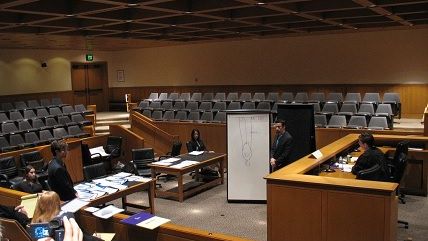Do Prosecutors Have an Unfair Advantage in Our Criminal Justice System?
Reagan-appointed judge questions fairness of criminal-justice system

One of California's most prominent federal judges, Alex Kozinski of the Ninth Circuit court of appeals, has sparked a nationwide debate about the state of the nation's criminal-justice system with a recent 42-page jeremiad in the Georgetown Law Review. The article depicts a system that tilts heavily in favor of district attorneys, incarcerates thousands of innocent people and fails to hold accountable prosecutors who abuse their power.
The judge's piece challenges many of our fundamental assumptions about the justice system. It is a compelling and important read — especially as legislatures around the country wrestles with issues of prison overcrowding, police reform, changes to civil-asset forfeiture laws, police body camera bills and the like.
"Police investigators have vast discretion about what leads to pursue, which witnesses to interview, what forensic tests to conduct and countless other aspects of the investigation," Kozinski wrote. "Police also have a unique opportunity to manufacture or destroy evidence, influence witnesses, extract confessions and otherwise direct the investigation so as to stack the deck against people they believe should be convicted." Wow.
A recent admission by an elite FBI forensic unit "gave flawed testimony in almost all (of the 268) trials" it testified in over two decades, according to an article he quoted. "How can you trust the professionalism and objectivity of police anywhere after an admission like that?" Kozinski asked.
By the way, Kozinski is no liberal and was appointed to the court in 1985 by President Ronald Reagan. Yet he blames the nation's incarceration rates — far higher than any other industrialized nation, and far beyond the rates in authoritarian China — on a "war on drugs" (that ramped up during the Reagan era), along with mandatory minimum sentences and three-strikes laws.
The judge is dismayed at the unwillingness of the system to examine credible allegations of wrongful convictions. Those inmates — 125 nationwide in 2014 — who have been exonerated largely because of the Innocence Project are the rare "lucky" ones where clear evidence still exists, he argued. But it's often a tough road. (For instance, the Innocence Project in California has produced compelling evidence that 12 people are serving long sentences for crimes they did not commit, yet 11 of them still languish in prison.)
He argues that Americans accept some truths that might not be so true: eyewitnesses are reliable, fingerprint evidence is unassailable, witness memories are reliable, prosecutors play fair, confessions are infallible, and guilty pleas always mean guilt.
On the last point, he laments "the trend of bringing multiple counts for a single incident – thereby vastly increasing the risk of a life-shattering sentence in case of conviction – as well as the creativity of prosecutors in hatching up criminal cases where no crime exists and the over-criminalization of virtually every aspect of American life." Faced with long sentences and padded criminal charges, many people simply cop a plea and avoid the risk of spending decades in prison.
The judge's solutions fall into two categories: openness and accountability. He calls for requiring prosecutors to be more open and rigorous about, say, releasing any exculpatory evidence. He calls for video-recording interrogations, limiting the use of jailhouse informants and better vetting of expert witnesses. He also suggests creating panels that investigate claims of wrongful conviction and ones to look into allegations of prosecutorial misbehavior. He advocates eliminating "absolute prosecutorial immunity," which currently means that prosecutors aren't held liable even when they engage in misbehavior.
Some other thought experiments: video-recording juries so judges can see if jurors followed instructions and eliminating judicial elections, which will enable judges to be less concerned about being portrayed as insufficiently tough on crime. My favorite: Repealing many felonies given that "a big reason prosecutors have so much leverage in plea negotiations is that there are many laws written in vague and sweeping language, inviting prosecutorial adventurism."
Criminal-justice reformers are seeing more acceptance of their ideas in recent years given a variety of national news events. They should be encouraged to have an influential new ally.


Show Comments (82)